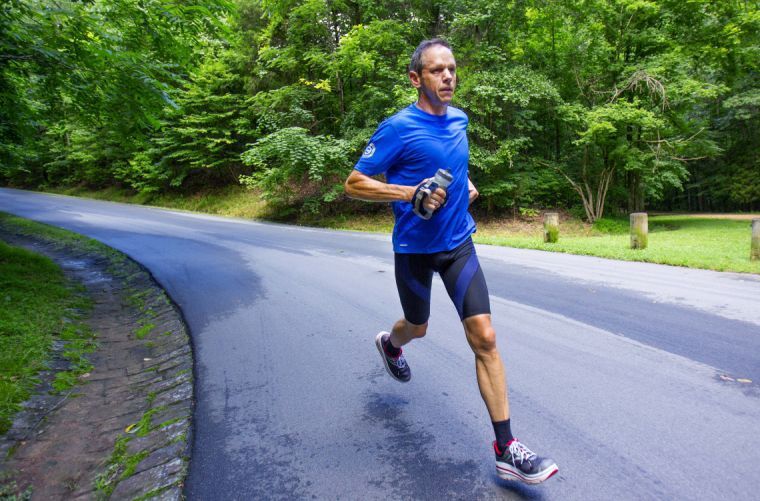For most of us, running a marathon is a nearly insurmountable challenge. A marathon, after all, is 26 miles long and can involve temporarily shrinking half an inch due to lack of water, sustaining short-term kidney damage and wobbling over the finish line. Though a marathon might be a big enough challenge for most people, it isn’t enough for Charlie Engle. Engle is an ultramarathon runner and as such, he’s no stranger to completing staggering physical challenges. What doesn’t get mentioned as much, however, is that some of Engle’s most grueling challenges have been mental and spiritual—namely, getting sober and maintaining his peace and purpose.
Before that, it’s worth running through (forgive me) some of the incredible things Engle has accomplished thus far. Before he got sober, he ran the Big Sur marathon and the Boston Marathon. He entered his first ultramarathon in 1996 in Brisbane, Australia by accident, thinking it was shorter—and ended up winning the men’s division anyway. He ran more events after that, including the Borneo Eco-Challenge, a 12-day adventure race where runners trek 320 miles and some change through the jungles of Borneo. Finally, Engle ran for 111 days straight all the way across the Sahara desert. That’s 4,300 miles. To put that in perspective, that’s about 38 miles a day—in other words, a marathon in the morning, a lunch break and a second marathon in the afternoon for 111 days straight.
He even wrote his own memoir, Running Man, detailing his life and experiences (and in typical Engle fashion, he overdid it: “I wrote 800 pages for my 300-page book”). Although Engle has been written about ad infinitum, the hardest part about his story is explaining where his Herculean drive comes from. To hear him tell it, it actually has a lot to do with childhood and addiction. “Like with most addicts, it’s complicated,” he says. “When I was a kid, I distinctly remember that I had this very bohemian upbringing. I liked to call myself ‘lovingly neglected.’ My mom was 18 years old and a theater major, so I was around a lot of adults.”
While Engle remembers his childhood warmly, the environment he lived in did expose him to alcohol and drugs like marijuana at an early age. “Regularly in my house, there was not a lot to eat or drink,” he says. “It was like living in a college dorm room almost. When I was about 10 years old, I woke up at two in the morning and there was nothing in the fridge. So I walked back through and grabbed a beer sitting on the table and I drank it. And I liked it. I liked it immediately.”
Even though that formative beer didn’t immediately lead Engle into the lifestyle of addiction, he says that it definitely planted a seed that grew in his college years. Though he was active in sports and involved in extracurriculars in high school, college was a wake-up call. “I went to UNC Chapel Hill and I think I expected there to be a ‘Welcome, Charlie’ banner on my dorm,” he says with a laugh. “What I found out very quickly was that I was actually pretty average.” Like any young adult whose self-image was in jeopardy, Engle looked for another thing to excel at—and found it almost immediately. “What I discovered by accident is that I was an All-American, first-team drinker. I could drink more than anybody else around,” he says. “It’s not the identity that one looks for, but that sort of became my identity in college.”
Drinking quickly escalated to harder drugs, all of which cost Engle a lot of time. “I did cocaine, I dealt cocaine,” Engle says. “The first time I tried it I didn’t feel a thing. Then the second time, everything changed. Everything was clearer and I had big plans and I was going to do all the things the person says they’re going to do when they’re on coke. And I spent the next 10 years after that night chasing that first high.” Engle’s rock bottom happened in Wichita, Kansas in 1992. He was on a cocaine binge and at the end of it, his car was shot at with a hail of bullets. He attended AA that same day and started on the path to sobriety.
It was in sobriety that the true self-discovery began. “Once I got sober, the mission for me was to pound the addict out of me,” Engle says. “If I could’ve taken a scalpel and cut the addict out of me, I would’ve done that. And it took me three years to realize that the addict was all the best parts of me. It wasn’t the part of me I needed to get rid of, it was the part of me I needed to nurture and point towards the things I really wanted to do.”
Although Engle adheres to a 12-step recovery program, he says that extreme physical exertion (put more bluntly: physical suffering) was a kind of spiritual key to unlocking the treasure of his potential. “The other ways to cause yourself pain are [an unhealthy] physical relationship, a lousy job,” he says. “Those are long-term commitments that are hard to untangle. If I go race a 100-miler, I actually know that 100 miles is going to end one way or another. I want to get to a place during that 100-miler that I desperately want to quit. That’s actually why I’m there, to get that feeling and then push past that.”
In fitting with that spirit, Engle’s newest adventure is the 5.8 Expedition, an ambitious undertaking which plans to have Engle race from the points of lowest to highest altitude on all seven continents. The crown jewel of the project is to be a trek from the Dead Sea in Jordan to the top of Mount Everest—but there are other races to complete first. “Phase one of 5.8 is going to happen in June,” he says. “It’s going to be in Africa, so from the lowest place to the top of Kilimanjaro.” Although many of us might tremble in the face of such a challenge, Engle couldn’t be more excited. “The point is that all of us live within this tiny 5.8 miles of atmosphere that surrounds the planet,” he says. “I think it’s a metaphor for life. We’re all in this together. Running in Africa or South America or Badwater, those are the payoffs for being sober. I get to do things like that. I get to go suffer in those places.”
Engle’s many high-profile races also have environmental and humanitarian projects attached as well, and 5.8 is no different. Though the project will undoubtedly inspire others, spread awareness and raise money for Engle’s newest environmental non-profit We Are One Village, the core motivation is still selfish, in a sense. “I’ve come to the deep understanding that service is incredibly selfish,” he says with a laugh. “Hard physical suffering, if I could put a picture to it, is like taking a firehose and cleaning out my insides to replace it with something better. I can’t find another way to have that sort of replenishment.”



